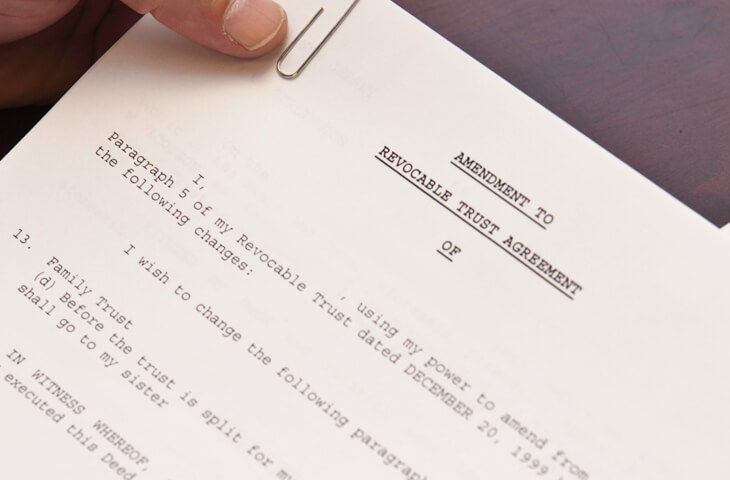Have you heard of a revocable trust, also often referred to as a “living trust?” It can be a great legal tool to add to your estate plans, especially considering a revocable trust, when properly funded, can remove assets from your probate estate. Removing assets from your probate estate means that they escape the arduous and often expensive probate process. This is a win in and of itself. Furthermore, a revocable trust can help protect beneficiary interests in the trust from being vulnerable to creditors or poor spending habits. It must be clear, however, that these benefits can only be achieved with a properly established and properly drafted revocable trust. In order to help maximize the benefits of a revocable trust, here are some tips on what clauses to include in your revocable trust document.
Get The Benefits of A Trust in Your Estate Plan
Clauses to Include in Your Revocable Trust
One of the clauses featured in your revocable trust should, of course, be one that states that the trust is revocable. You should also be clear in stating the terms of your trust. These are important elements of a successfully established revocable trust and should be thoughtfully considered as well as detailed in execution.
There should also be a clause in your trust which appoints a trustee. Your trustee will be tasked with managing the trust assets for the benefit of the named trust beneficiaries. This is an important task and one of significant responsibility. Be sure to take care in selecting the trust beneficiary and consider all of your options. You may also want to consider naming an alternate trustee or a successor trustee which will assume the duties of the primary trustee selection should that person or entity be unable or unwilling to serve in this capacity.
One of the benefits offered by a revocable trust, as well as other trust types, is the fact that they are very difficult to successfully contest. Courts do not like to interfere with the intent of a trust settlor and therefore try to avoid altering the trust in any way as it could easily interrupt the true intent of the trust. A court will only allow a trust to be challenged and to accept such a challenge under extremely limited circumstances. You can, however, add another layer of protection against a person contesting your trust at one point or another. This can be achieved through a contest clause included in your revocable trust. This clause states that anyone who challenges the trust will not be entitled to any benefits from the trust. So, a person who stands to gain from a trust may have much to lose by contesting the trust.
A spendthrift clause is another trust clause that you may want to consider including in your revocable trust. This is the clause that can offer a strong layer of protection against creditors of your trust beneficiaries as well as the beneficiaries themselves. You see, this clause limits the beneficiaries’ ability to access trust funds. The funds are owned by the trust and only distributed under specified circumstances. The beneficiaries do not have the right to request access to trust assets. Because of the limited rights of the beneficiaries, creditors will not be able to go after trust assets and beneficiaries will be limited in their ability to squander trust funds.
Pittsburgh Estate Planning Attorneys
Do you want to know more about revocable trusts and whether establishing one may benefit you and your estate plan? Talk to the knowledgeable team of estate planning attorneys at Jones, Gregg, Creehan & Gerace about your options. Contact us today.
